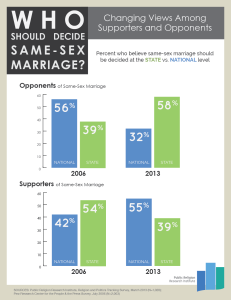 State leaders in Utah have filed an emergency appeal with the U.S. Supreme Court, requesting the review of a federal judge’s ruling to allow same-sex marriage in the socially conservative state. The decision, handed down December 20, overturns a voter-approved ban on same-sex marriage in Utah. The majority of the state’s population is Mormon – 62.2 percent according to recent tallies – a group broadly opposed to homosexuality. State officials said in their filing Tuesday that allowing same-sex marriages is “an affront to the sovereignty of the state and its people.”
State leaders in Utah have filed an emergency appeal with the U.S. Supreme Court, requesting the review of a federal judge’s ruling to allow same-sex marriage in the socially conservative state. The decision, handed down December 20, overturns a voter-approved ban on same-sex marriage in Utah. The majority of the state’s population is Mormon – 62.2 percent according to recent tallies – a group broadly opposed to homosexuality. State officials said in their filing Tuesday that allowing same-sex marriages is “an affront to the sovereignty of the state and its people.”
The appeal lands on the desk of Justice Sonia Sotomayor, who has jurisdiction over Utah and neighboring states and who will have the choice of either deciding the case herself or deferring to the full court for a ruling. Given the high-profile nature of the court’s DOMA decision in June, which expanded rights for gay and lesbian couples but avoided ruling on whether same-sex marriage is a constitutional right, legal analysts expect Sotomayor will defer to the full court to decide the Utah case. The Supreme Court’s handling of the case will affect similar state laws on same-sex marriage across the country.
But should the question of whether to legalize same-sex marriages be decided at the federal level, or should it be left up to the states? Well, that depends on who you ask. As you can see in our previous Graphic of the Week, of the slim majority of Americans who support allowing gay and lesbian couples to marry legally, 55 percent favor a national approach to decide the issue compared to 39 percent who’d prefer it be handled at the state level. The solid minority of Americans who oppose same-sex marriage take a different approach, with just under one-third (32 percent) preferring the question be addressed at the national level compared to nearly 6-in-10 (58 percent) who favor a state-level approach.
The Supreme Court’s handling of this case will certainly send a message about its stance on the legality of same-sex marriage, with the nearly 1,000 gay and lesbian couples in Utah who’ve purchased wedding licenses since the ban on same-sex marriages was overturned in their state set to be most immediately affected.